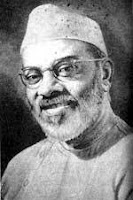J C Kumarappa posed that question his book, Economy of Permanence, which was first published in 1945. He argued that in the final analysis “values and valuation” would determine the direction to be taken. He viewed the choice between cottage industry and large-scale production as an ethical choice as to which type of economy would be preferable. He associated cottage industry with “permanence and non-violence”, and large-scale production with “transience and violence”.
Kumarappa has been described as an ecological economist. He was a follower of Mahatma Gandhi, who wrote a foreword to his book.
Some of Kumarappa’s views seem to have been largely a product of the context in which he lived, but others resonate more broadly. Similar views have been taken up by many affluent consumers in high-income countries. In what follows, I will discuss first why Kumarappa associated large-scale production with violence before considering why he associated it with transience.
Violence
Kumarappa
recognizes the potential for specialization and market transactions to be mutually
beneficial for the people involved. On that basis, readers might expect him to
view wealth accumulation via specialization, trade, and market competition to
be a peaceful process.
However,
Kumarappa argues that large-scale production prompted industrialized countries
to hold other countries in political subjection to obtain materials. He also
suggests that large-scale production “is the root cause of wars”. He claims that
machines must make full use of productive capacity, rather meet market demand.
That results in surplus production. Wars are started to capture markets.
I see
several problems with that line of reasoning, but I will only focus on the most
obvious one here. Kumarappa seems to assume that manufacturers have control of
armies that can be used to ensure access to raw materials and markets. That
seems to me to be a strange assumption to make, but I can understand why an Indian
economist might see things differently in the light of the history of British
colonial rule.
Transience
Kumarappa
argues that an economy based on large-scale production is built on the “quicksands”
of “profit, price, purchasing power, and foreign trade”. He suggests that material
standards of value and personal feelings of consumers cannot have “any degree
of permanence” because people change and are perishable. For permanence to be
achieved, the standard of value must be objective and controlled by ideals that
have enduring qualities. He claims that civilization had endured in China and
India because it was based on altruistic and objective values.
The value that Kumarappa places on permanence may require
explanation because Hinduism, the dominant religion in India, shares with
Buddhism the doctrine that everything is in a constant state of change.
Kumarappa was a Christian, but I don’t think that explains as much as his
reverence for what he describes as “the secret of nature’s permanency”. He was referring to ecological factors which “function
in close cooperation to maintain the continuity of life”.
Kumarappa was particularly concerned about the impact that
the products of large-scale production were having on traditional village life.
He argues:
“We are often led away by low money prices ignoring the
great gashes in our economic and social organisation made by such short-sighted
choice of ours. … Money value blinds the
vision to a long range social view, so that the wielder of the axe fells the
branch on which he is standing”.
Kumarappa argues that moral values are attached to every
article sold in the market. We should not ignore such values and say “business
is business”. Accordingly, anyone who enters into a commercial transaction has
a grave responsibility to ensure that she does not become party to
circumstances that she would not consciously support. He believed that the
consumer is only able to bring her scale of values into play when goods are
made locally.
Different views of progress
Kumarappa had a very different view of economic growth than
is presented in my book, Freedom,
Progress, and Human Flourishing. It may be worthwhile to try to
pinpoint the reasons for this.
I don’t think Kumarappa would have any problems with my
definition of progress as the growth of opportunities to obtain the basic goods
of a flourishing human. He would probably agree, more or less, with my list of
the basic goods – wise and well-informed self-direction, health and longevity,
positive relationships with others, living in harmony with nature, and
psychological well-being.
Kumarappa would probably begin to object at the point where
I assert that economic growth counts as progress to the extent that people
aspire to have the goods that it offers. He might suggest that people who aspire
to have those goods are mistaken because they could flourish to a greater
extent by maintaining a simple lifestyle. The more powerful argument he would
offer is the one presented above - that the products of new technology are
disruptive to existing economic and social organisation.
I would respond by referring to what Deirdre McCloskey has
referred to as the bourgeois deal. People in industrialised countries have been
willing to accept the possibility that the introduction of new technologies
might disrupt their lives because they have good reasons to expect that they,
and future generations, are likely to benefit from the expansion of
opportunities that it provides.
If that line of argument had been presented to J C Kumarappa in 1945 I imagine he
would have viewed it as “pie in the sky”. I am less sure that he would hold the
same view today.
Cottage
industry
I don’t know
much about the economic health of cottage industry in Inda today, but it does continue
to exist. The photo shown at the top of this article was taken at Kalra’s
Cottage Industry in Agra, when I visited there last year. (By the way, the
service offered was excellent. The hand-knotted floor rug I purchased was delivered
to my home in Australia without any problems, and in perfect condition.)
My point is
that as their material standard of living rises, many people are willing to pay
more for high quality products of cottage industries than for mass produced
items. Many people also become increasingly concerned about such things as the levels
of remuneration of workers who produce the products that they buy and potential
environmental damage of production methods. People tend to pay greater
attention to such concerns when they feel that they can more readily afford to
do so.







